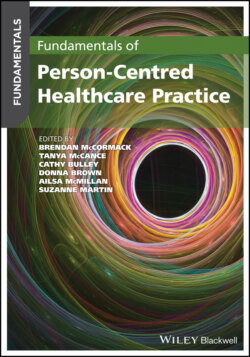Читать книгу Fundamentals of Person-Centred Healthcare Practice - Группа авторов - Страница 43
Person‐centred practice
ОглавлениеDear Oscleans,
I am writing to you to welcome you to our planet. We as a planet of people who care for one another are moving towards becoming more person‐centred. I am aware that you are not familiar with the term person‐centred, therefore, this letter aims to provide you with an understanding of what it means to be person‐centred. Moreover, I hope to provide you with my understanding of person‐centredness and how my learning on the topic has changed the way I view my practice. McCormack and McCance (2017, p. 41) have provided a definition of person‐centredness:
person‐centredness focuses on the formation and fostering of healthful relationships with service users and others significant to them in their lives, as well as between all care providers. It is underpinned by values of respect for persons (personhood), individual right to self determination, mutual respect and understanding. It is enabled by cultures of empowerment that foster continuous approaches to practice development.
The idea of person‐centredness has been formed from the theory of personhood which has been widely described in the literature. Many scholars have presented their views of the theory. One philosopher who has written about what it means to be a person is Immanuel Kant who believed that personhood was the ability for a person to think and act morally and this is what differentiated humans from other species (von Bertalanffy 1968). His philosophy is one which I most associate with. It is what I consider to be the basis of the care that I provide. My view of person‐centredness and particularly person‐centred practice is that it is focused largely on being with the person and connecting on a human level. I believe that the most person‐centred care I provide is when I have been completely authentic with a family. This has included connecting with them on a personal but professional level and remaining transparent throughout my work with them. I encourage the families with whom I have worked to speak freely about their concerns and I have been sympathetically present. I have shared my knowledge with them and worked in partnership to come up with a decision that is suited to their needs.
In addition, I believe that in order to engage authentically with families it is important to recognise our own limitations. A large part of shared decision making with parents and families requires having adequate knowledge/information about a particular illness or treatment. As I am still at the beginning of my career as a specialist community health nurse, I am aware that I do not always have the correct knowledge or information to share with families. Therefore, in order to engage authentically, I inform them of my limitations in knowledge and state that I will seek the correct information in order to support them in making the best decision for their child. This has been generally well received and on reflection it appears that most families appreciate honesty and transparency. So, as I start my career as a newly qualified specialist community health nurse, I will continue to be honest about the extent of my knowledge with families and ensure that I signpost them to the relevant service that will be able to better inform them. Ultimately, my view of person‐centred practice has moved on and I have learned that is important to work towards ‘person‐centred moments’ and increasing the frequency of these moments in practice to create a context where person‐centred practice can be realised.
I hope this letter better informs you of how I have viewed person‐centred practice and how it has shaped the way I will practise in future. I would like to welcome you to our planet and hope that you too can become part of the movement towards person‐centred practice.
Yours sincerely,
C Thomson
This letter was written by a student (Caitlin Thomson) who at the time of writing was undertaking education as a specialist community health nurse (also known as a health visitor) at Queen Margaret University, Edinburgh. Caitlin was engaging in an exercise of writing to a fictitious ‘alien visitor’ known as an Osclean explaining person‐centred practice to them.
